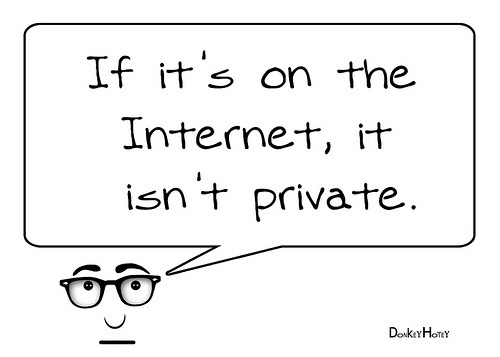
Privacy has been a concerning issue in all the Social Media channels and recent moves few of Social Media giants like Twitter and Facebook is appalling.
This month alone Facebook has removed another privacy filter of unsearchable by name and google is alerting users to a change in Privacy settings in Google plus that allows your image and name to appear in google ads.
So, Dear user, Here are 9 ways you can maintain (some) privacy.
1. Sign in and out of your online accounts: Yes, it’s convenient to have a computer remember passwords and other login details, but you’re playing with fire. At the most basic level it means anyone can sit at your computer and “be you” on your networks. At a more sophisticated level anyone who does hack into your computer now has access to your accounts. So, logout when you’re done and log back in each time …
2. Be a “Friends Only” kind of Facebook user: Understanding your FB settings may take 30 minutes one day, but it will be the best half hour you spend on yourself on the social network. Remember that anything other than the “Friends Only” setting means people you don’t know can see and share a lot about you. You also should be aware by now, but some apparently are not, that Facebook’s default is to set all of your privacy settings to “public.”
3. Use a password on your devices: If you’re not using a password to get into your smartphone or laptop etc. that’s the equivalent of leaving your apartment or car unlocked. Think about the treasure trove of personal information now stored on those devices. Maybe, just maybe, someone finding your device won’t take advantage, but maybe not.
4. Turn on 2-step Authentication in Gmail: This means that in order for your Gmail account to be accessed from a new device, a person needs a code that’s texted to your cellphone. So, even if someone gets your password somehow, they won’t be able to use it to sign into your account from a strange computer.
5. Encrypt everything: Whole-disk encryption of computers isn’t a bad idea. If your laptop is lost or stolen, it’s nearly impossible for anyone else to get into your data without your password. The latest versions of Apple’s iOS automatically encrypt the entire smartphone or tablet if a passcode is enabled. On Android devices, encryption is an easy option in the Settings menu.
6. Clear your browser history and cookies regularly: Consider changing your browser settings so that the cache is automatically cleared every session. Go to the Privacy setting in your Browser’s Options and tell it to “never remember your history.” This will reduce the amount you’re tracked online, although a recent New York Times story – Selling Secrets of Phone Users to Advertisers – shows that the growing field of anonymous data tracking may eventually make this a moot point.
7. Review the apps that have access to your social media accounts: Regularly review which applications have access to your social media accounts. Revoke access for applications you no longer use. In future: make sure applications you download use social media carefully. If they ask for your contacts and to post to your account don’t agree to this lightly.
8. Get an app that you can use to remotely wipe your device if it is stolen or lost: Some of these apps can show where the thief took your phone and can erase all the data. All of them allow you to do this from a separate device.
9. Put a Google Alert on your name: Go to Google Alerts enter your name, and variations of your name, with quotation marks around each. Select how frequently you want alerts (daily is probably fine for most of us) and where you want them sent. It’s the easiest way to stay on top of what’s being said about you online. Just be aware: it may only catch 85 to 90 percent of mentions and some alerts may take more than a day or two to get you. But it is free.
Other ideas:
Five ways to stop the NSA from spying on you (from the Washington Post) offers ways to thwart the agency’s snooping.
Strategies People Use to be Less Visible Online is a story from the social media news aggregator Mashable. It finds that “64 Percent of American adults protect their online identities by clearing cookies and browser history” and has a useful chart listing all of the other tactics its survey respondents said they practiced.
In the future:
Imagine a small box sitting next to your computer that encrypts everything you do online. That’s the principle behind a device call the Don’t Snoop Me Bro Tunnel that I first read about recently on the Bit Rebels site. The DSMB will be (when it is available early next year) an out of the box plug-and-play technology that connects to your computer and claims to completely camouflage your online presence. The Bit Rebels story linked to here has a full description and demo video.
So, there you have a few ideas that might help you hang onto or gain back some shreds of privacy. Of course, the ultimate road to privacy is to stay off the web altogether and to erase all past history on the web … yeah, right! Like that is going to happen.
What do you think? Can you maintain some privacy and still engage on social media and the Internet?
Source – [SocialMediaToday]

